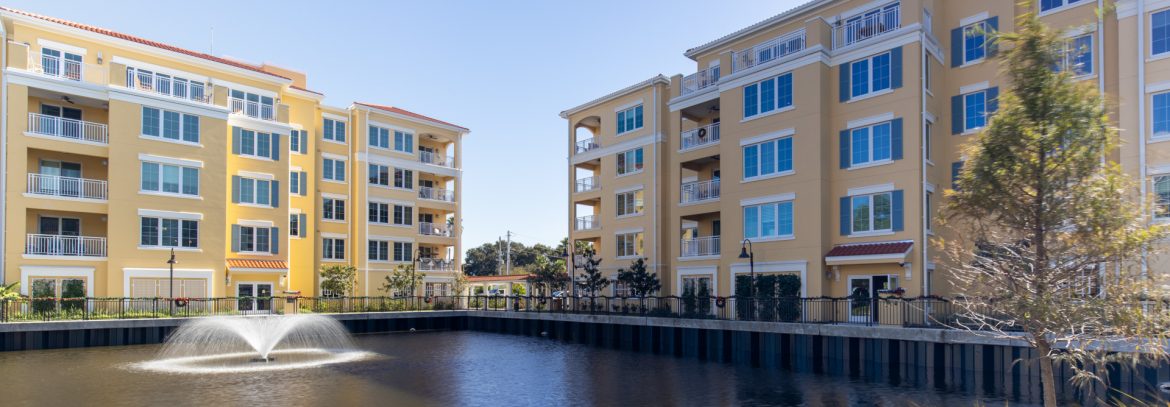Situated on a beautiful 16.5-acre campus on the island of Venice, Florida, Village on the Isle is
one of the first continuing care retirement communities on the Gulf Coast of Florida. It is a vibrant
and visionary community offering the full continuum of care and guided by its mission to “share God’s love by promoting individual growth and dignity, enhancing the quality of life and meeting the human and spiritual needs of our residents, staff, and community.” Long-term care facilities and their vulnerable residents are being hit especially hard by the novel coronavirus and Village on the Isle is one of many to take action against this deadly pandemic.
Village On The Isle CEO Joel Anderson recently responded to Florida Governor Ron DeSantis’ decision to release the names of long-term care facilities in Florida that have positive COVID-19 cases. “We believe the decision to release the names of these facilities is the absolute right call by the governor for everyone, including care providers, residents, families and staff,” said Anderson. “The release of the names is not intended to point the finger at any particular care provider, because the coronavirus does not skip over any household, place of business or worship, and other public spaces without the risk of someone being infected. I’m sure that long-term care providers, hospitals, and local, state, and federal governments, businesses and the general public overall affected by the virus would respond differently in what we know now versus then,” said Anderson.
Village On The Isle began early interventions in February followed by major campus-wide safeguards in early March for their 450 residents and 300 employees. “COVID-19 is a public health safety pandemic, and we know as a matter of fact that older adults and persons with severe underlying health conditions are the greatest at risk,” continued Anderson. “Therefore, we have taken every action necessary to prevent the spread of the novel coronavirus within our community and followed the lead of the Centers for Disease Control and Prevention, and the state and local health departments, to ensure we are doing everything in our power to protect residents.”
In late February, Village On The Isle began restricting visitors and screening residents and
employees within its healthcare operations. The 16-plus acre campus also has over 250 retirees living in apartment homes and cottages, where they usually enjoy restaurant-style dining, social and wellness programs, and around-the-clock security and urgent response. However, since early March, they chose to limit communal gatherings. “We have had to transition very quickly to protect both residents and staff members from the risk of the virus,” said Anderson. “Our team has worked non-stop to alter programs and services, including delivering all meals to their home and managing residents’ needs by ordering and delivering groceries and prescriptions.”
Village On The Isle then proceeded on March 18 to restrict all visitors to their campus due to the
recommended federal stay-at-home guidelines. “Our communities are built on hospitality and socialization,” said Anderson. “It is by far one of the advantages of living at a community like Village On The Isle to enjoy social, recreational, dining, and other communal experiences that keep residents active, healthy, and engaged in life. That said, residents have adapted well. They are using technology more with neighbors, friends, and loved ones, and also using the in-house television channels, where staff launched in-home exercises for residents and worship services, including a special Good Friday and Easter service. They are also encouraging residents to go outdoors for regular exercise and to enjoy nature. We have to look at serving residents holistically – mind, body, and spirit. We know social isolation is proven to negatively impact one’s overall health and well-being, so ‘social distancing’ is not proper for us; therefore, we use terms like ‘physical distancing’ instead. We need everyone to maintain proper physical distancing to avoid the risk of the virus.”
Many residents are former clinicians, nurses and doctors, scientists and epidemiologists, teachers and professors, and corporate executives responsible for directing large organizations and they have provided vital feedback. “We’ve benefitted greatly by the collective brain trust of our residents and the open lines of communication we foster with them,” said Anderson. “Our leadership team receives emails, voice and video messages, and hand-written notes from residents, which all applaud the efforts taken by Village On The Isle to safeguard residents and staff. We value our residents’ opinions as we do not want them to feel trapped in their homes during this pandemic. We want them to be safe and able to make good decisions for themselves. We also want them to find purpose through all the current circumstances.”
“I believe the general public underestimates how active elders are in their communities,”
Anderson added. “Some people, including healthcare providers, believe we are one giant nursing
home, which is the furthest from the truth. Our residents remain as active as they did in their
younger years and maybe even more nowadays. They play golf and tennis, go to the gym daily,
fish and enjoy the beaches, work part-time jobs, consult, and volunteer in their churches or other
community groups. Our nation has major blind spots and we need to quit judging and perceiving the capabilities of older adults by their physical appearances. Our elders are capable of making major decisions throughout their life. They are active and can be amazing contributors to make us a better and more caring and loving society.
“It is unfortunate that long-term care providers are seemingly often viewed under one, negative lens. I firmly believe this is not an accurate portrayal of the dedicated people working in these facilities. In fact, our long-term care providers have some of the most capable staff and medical advisors in caring for the nation’s most vulnerable. I also believe it is imperative that long-term care facilities have increased access to testing, more broadly and quickly, so that our long-term care providers can help to manage the spread of COVID-19. If there are available test kits, we can use registered nurses and other trained clinical staff at our facilities, including attending physicians, to perform the tests and deliver them immediately to a laboratory for results. This approach helps us get ahead of the virus spreading and will save lives.”
Anderson concluded with a message of hope, “Village On The Isle will continue to do absolutely everything in our power to protect our residents and staff from this virus, and we will continue to foster an environment of transparency and open communication with residents, families, staff and beyond.”

